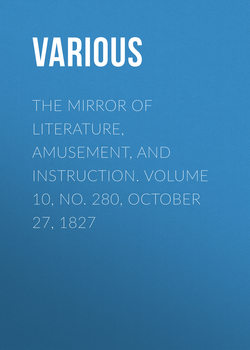Читать книгу The Mirror of Literature, Amusement, and Instruction. Volume 10, No. 280, October 27, 1827 - Various - Страница 1
Illustrations of Shakspeare
ОглавлениеNO. XIII. ELSINEUR, FROM HAMLET'S GARDEN
We augur that the above will prove one of the most interesting of our Shakspearian Illustrations, inasmuch as the garden where Hamlet was wont to revel in the fitful dreams of his philosophic melancholy, is holy ground. "The lapse of ages and the fables of the poet," says a delighted visiter, "were all lost in the reality of Shakspeare's painting: the moment of his scene seemed present with me; and eager to traverse every part of this consecrated ground, I had already followed Hamlet every where; I had measured the deep shadows of the platform, encountered the grey ghost of the Royal Dane, had killed Polonius in the queen's closet, and drowned poor Ophelia in the willowed stream. The modern aspect of Elsineur is, however, far from inviting, and not a single vestige presents itself that bears the smallest trace of this town ever having been hallowed by the mausoleum of an Ophelia, or proudly decorated with the stately walls of a royal palace."
About a mile from the town is a place that bears the name of Hamlet's garden. Here is no relic of ancient interest, excepting the tradition, which affirms that to be the spot where once stood the Danish palace, and where was enacted that tragedy, which has been so gloriously immortalized by the genius of our great dramatic bard.
The present edifice is erected on the brow of a gently rising hill, the summit of which is gained by means of a winding walk cut through a small shrubbery. In the surrounding prospect, the town of Elsineur, on the plain beneath, presents itself ill-built, red, and without any public building, or spire, to vary its sameness. Far to the left of the city stands the castle of Kronenberg, a bold and fine feature; the waves of the Cattegut roll at its feet; and are bounded on the opposite side by the Swedish coast. When the annexed sketch was made, 400 sail of merchants' ships were lying there at anchor, which added greatly to the interest of the picture. The small village on the distant shore is Elsenberg. The forest of Kronenberg is indeed proudly situated; the form of the building, with its spires and minarets, is nobly picturesque; the fabric is of grey stone; and its innumerable windows, varied towers, and other architectural ornaments, make it a striking and beautiful contrast to the dull uniformity of the town.
Sir Robert Ker Porter, in his visit to this sacred spot, collected a few interesting circumstances at the fountain-head, relating to Shakspeare's northern hero, from the very source whence our poet must have drawn the incidents of his tragedy, viz. the "Annals of Denmark," written by Saxo Grammaticus in the twelfth century. The work is in Latin, and in our next number we intend inserting a short abstract of Hamlet's story. It will be curious to compare the dialogues of the original with their counterpart in the play.
ON THE APPEARANCE OF AN AURORA BOREALIS, ON THE NIGHT OF THE 25TH OF SEPTEMBER
BY A LADY IN HER THIRTEENTH YEAR
(For the Mirror.)
What may this mean? this ruddy blaze of light,
Breaking effulgent through the stilly night;
Darting its blood-red form along the sky,
Glowing with heaven's glorious majesty.
How with its phalaxy of rays unfurl'd,
It comes: its radiance circling all our mother world.
The pharos of the night; where gods might dance.
Heedless of mortals dull, unmeaning trance;
Where spirits in their mysteries might find,
A sail to float upon the yielding wind;
But see, it flies, its shadow; form outspread,
In fainting radiance o'er earth's startled bed,
Yet rests, like the death gleam of beauty's eye,
Or last rich tint of an autumnal sky.
And now in fleecy clouds the heav'ns appear.
Again it darts, dreamer, there's naught to fear;
Again, like a proud spirit of the sky,
Though conquer'd, breaking forth in majesty.
Britain, for thee this fearful warning sent,
Oh! mock not foolishly its dire portent;
For now that vice on all her malice wreaks,
Charms on the stage, and in the assembly speaks;
Now that with cheating fires she shameless dares,
Fortunate where virtue once defied her snares;
Again I say, for thee this warning sent,
Oh! mark it well, mock not its dire portent.
F.J.H.
